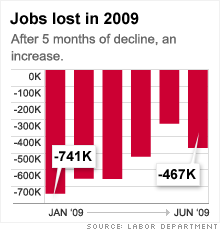Here comes the recovery. Honest.
Many economists say weak June jobs and retail sales aren't reason to give up on hopes for a solid bounce back later this year.

NEW YORK (CNNMoney.com) -- After several months of growing optimism about the state of the economy, suddenly there's a lot of concern that a recovery has come off the tracks.
A June employment report included an unexpected jump in job losses. That was followed by last week's report of a nearly 5% decline in June year-over-year sales at major retailers other than discounter Wal-Mart Stores (WMT, Fortune 500), which no longer releases monthly results.
The gloomier economic outlook has hurt stocks, and prompted talk among some economists and policymakers about whether a new round of economic stimulus is needed to get the economy growing sooner.
But there are still many economists who believe the early signs of a turnaround in the economy are there -- and growing.
They're not saying the recession that started 19 months ago is already over. But many believe the economy will reach bottom and finally start to improve as soon as late summer. Some even believe employers could again start adding jobs before the end of this year.
"It would have certainly been better if the jobs report had continued to show improvement," said Lakshman Achuthan, managing director of Economic Cycle Research Institute, which specializes in calling when the economy will turn from recession to recovery and back again. "The fact that after a few steps forward we had a step back doesn't negate the indicators pointing to a recovery this summer."
Reasons for encouragement: There are several factors accounting for these economists' optimism.
They say that business inventories have been cut so deep that production will need to start to resume simply to keep minimal supply of product on shelves.
In the auto industry, for example, General Motors is restarting six of its assembly lines Monday after what was typically a two-week summer shutdown was extended to up to three months this year.
Chrysler Group also had its own extended shutdown as it went through the bankruptcy process. Ford Motor (F, Fortune 500), after cutting production plans repeatedly, recently announced it was increasing third-quarter production by 25,000 to deal with low inventories of some of its more popular vehicles.
The same kind of inventory bounce back is likely to be seen in many other industries, according to the economists who see a recovery sooner rather than later. They say much of the drop in gross domestic product, the broad measure of the nation's economic activity, at the end of 2008 and the first three months of 2009 came from businesses slamming the brakes on production due to excess inventories.
"If you just stop cutting inventory, you add $80 to $90 billion to GDP. That's pretty impressive," said Robert Brusca of FAO Economics.
The severe job cutting done by businesses over the past year is another reason some economists are expecting a bounceback sooner rather than later. They say the low employment levels should help corporate income rebound relatively quickly once demand starts to build again.
Thomson Reuters is forecasting two more quarters of double-digit percentage earnings declines in the second and third quarter, but a 187% jump in income among S&P 500 companies in the fourth quarter as they move to put the year-earlier losses behind them. That could be a key to employers hiring again, according to some economists.
"You have a super-lean corporate sector that should be able to generate earnings fairly quickly," said Joseph Carson, chief economist at AllianceBernstein. "You usually need the health of the corporate sector to flow to the labor markets, and I think that's the way this is playing out."
Jump in confidence: The Conference Board's CEO Confidence Index released last week showed a huge jump, with nearly 55% of business leaders expecting economic conditions to improve in the next six months, up from only about 17% in the previous reading three months ago.
Lynn Franco, director of the business research group's consumer research center, said that kind of jump in CEO confidence is a good predictor that spending on capital spending is about to increase, even if management will be more cautious about hiring again.
But businesses might not be the only ones poised to start spending again. Many economists believe there is pent-up demand among consumers that will cause a rebound in spending, once confidence in the labor market stabilizes.
"Even people with jobs have been pulling back on spending, concerned they're going to be next," said Brusca. "I think the people with jobs will spend a little more freely when they're less concerned about the economy."
Achuthan said two factors giving him hope are that the financial stimulus bill passed earlier this year has yet to have much effect on spending and jobs, and that credit markets are still constrained by troubled assets due to the problems in the housing market and foreclosures. He said it's possible both those things could change quickly before the end of the year.
"If the stimulus dollars start to hit, and the financial system starts to behave more normally, there is a wall of money that will begin to flow through the economy," he said. ![]()

